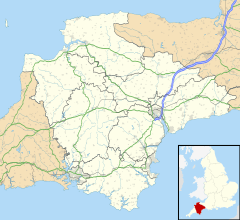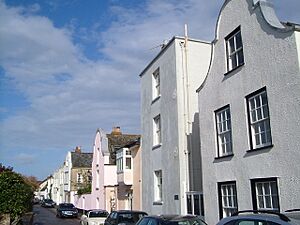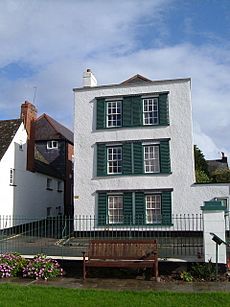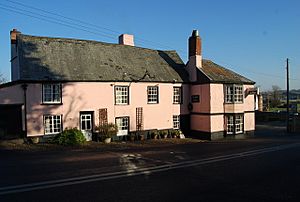Topsham, Devon facts for kids
Quick facts for kids Topsham |
|
|---|---|
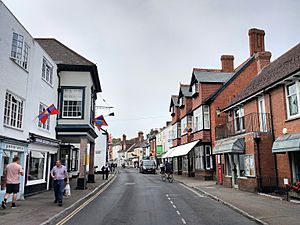 Fore Street, Topsham |
|
| Population | 4,146 (2021 census) |
| OS grid reference | SX966884 |
| District | |
| Shire county | |
| Region | |
| Country | England |
| Sovereign state | United Kingdom |
| Post town | EXETER |
| Postcode district | EX3 |
| Dialling code | 01392 |
| Police | Devon and Cornwall |
| Fire | Devon and Somerset |
| Ambulance | South Western |
| EU Parliament | South West England |
| UK Parliament |
|
Topsham is a charming town in Devon, England. It sits on the east side of the River Exe, close to where it meets the River Clyst. Located between the cities of Exeter and Exmouth, Topsham is known for its rich history as a port.
King Edward I officially made Topsham a town in 1300. Later, in 1966, it became part of the City of Exeter. In 2021, about 4,146 people lived here.
Topsham has its own train station on the Avocet Line, which connects Exeter Central to Exmouth. The railway celebrated 150 years of service to Topsham in 2011.
The town is famous for its beautiful setting, unique local shops, and lively community. This makes it a very popular place to live in the South West of England.
Contents
History of Topsham
Topsham started as a Celtic settlement. It became the main port for the Roman city of Isca Dumnoniorum (now Exeter) around the first century AD. It served this purpose until the Romans left Britain in about 400 AD. In the 600s, during Saxon rule, Topsham grew into a significant village.
The Anglican church of St Margaret in Topsham has been around since the 900s. King Æthelstan gave the land for the church in 937. Even though it has been rebuilt many times, it remains in its original spot.
In August 1300, Topsham received a special royal charter. This allowed the town to hold a street market and an annual fair. Today, a 'Charter Day' festival is held in August to celebrate this important event.
Topsham's location, with its safe harbour, helped it become a busy port. It was a hub for both fishing and building ships. Famous ships like HMS Terror (which was part of a lost Arctic expedition) were built here in the early 1800s.
Many houses in Topsham have a special Dutch style. This is because Topsham was an important port for cotton trade. Dutch bricks were often brought over from the Netherlands as ballast (heavy material to keep ships steady) on ships that had carried wool and cotton from England.
In 1966, Topsham became part of the City of Exeter's local government area. The M5 motorway section that goes through Topsham and crosses the River Exe was finished in 1977.
After a quiet period in the early 1900s, Topsham has become a very desirable place to live. The town's population has grown from 3,545 in 2001 to 4,146 in 2021.
Topsham Today
Once a major seaport, Topsham is now known for its beautiful buildings, lovely scenery, and nearby nature reserves. These reserves, like RSPB Bowling Green Marsh on the Exe Estuary, are important for wading and migrating birds. The entire Exe Estuary is a special protected area for nature.
The Topsham Museum is located in a 17th-century building with views of the Exe Estuary. It shows what homes looked like in the past and has displays about the town's history. It also features items belonging to the famous film star Vivien Leigh.
In 2021, the Sunday Times newspaper called Topsham "one of the best places to live" in the country.
National Cycle Route 2 goes through the town. In 2013, a new bridge opened, creating a path for cyclists and walkers. This bridge crosses the River Clyst and connects Topsham with nearby Ebford and Exton.
Name and How to Say It

The name Topsham comes from Anglo-Saxon times. It means "Toppa's village," named after a local landowner called Toppa.
There are two ways people say the town's name:
- Most people say it with the "sh" sound, like in "shoe."
- Older local residents often say it with an "s" sound, like in "tops."
Two towns in the United States, Topsham, Maine and Topsham, Vermont, were named after this English town.
Sports in Topsham
Topsham has several sports clubs:
- Football: Topsham Town FC is the local football club. They play in the Devon Football League.
- Rugby: Topsham Rugby Club has teams for men and women, plus over 200 junior players. In the 2021-2022 season, the men's team was promoted. The next year, they won their league and were promoted again! They also won the Devon Intermediate Cup.
- Other Sports: The town also has a bowling club, an outdoor swimming pool, a cricket club (Topsham St. James CC), and a sailing club.
Community Life and Fun
One of the main community spots is Topsham Pool. This is an open-air swimming pool run by the community. It was built in the 1970s with money raised by local people. The pool is open from May to September. A special group called the "Nutters Club" swims early in the morning, even when it's cool outside!
The Topsham Society was created to help keep Topsham a great place to live. They work to make sure new buildings fit in well and to teach people about the town's history and nature.
Besides St Margaret's Anglican church, Topsham also has a Methodist church, a Congregational Church, and a Roman Catholic church.
The Bridge Inn is a historic pub from the 1700s. It's famous for its traditional style and was even visited by Elizabeth II in 1998.
A monthly magazine called Estuary: A Monthly Community Magazine for Topsham is published in the town. It shares local news and events.
The Matthews Hall is a community centre in the middle of town. Local groups use it for activities like the Topsham Film Club and the Topsham Flower Club. A theatre group called Estuary Players performs plays there twice a year. The Community Association also runs a Saturday market at the hall and appoints the town crier.
Every two years, Topsham holds a "Longest Table" event. People set up tables end-to-end through the streets and bring food to share at their own tables.
The Estuary League of Friends is a charity that helps older people in the community.
Famous People from Topsham
Many interesting people have connections to Topsham:
- William Webb Follett, a well-known lawyer, was born here in 1796.
- Thomas Hardy's cousin, Tryphena Sparks, lived here and is buried here. She inspired one of his poems and was known for helping local fishermen.
- Dick Pym, a famous football goalkeeper, was born here in 1893. He played in the first FA Cup Final at Wembley Stadium in 1923.
- The newsreader Trevor McDonald used to live in Topsham.
- Both members of the folk music group Show of Hands live in Topsham.
- The actor Bill Pertwee (who played ARP Warden Hodges in Dad's Army) also lived here.
- The novelist Philip Hensher lives here, and his 2011 book King of the Badgers is set in a fictional town based on Topsham.
- The mountain climber Norman Croucher is also a resident of Topsham.
Images for kids
See also
 In Spanish: Topsham para niños
In Spanish: Topsham para niños


